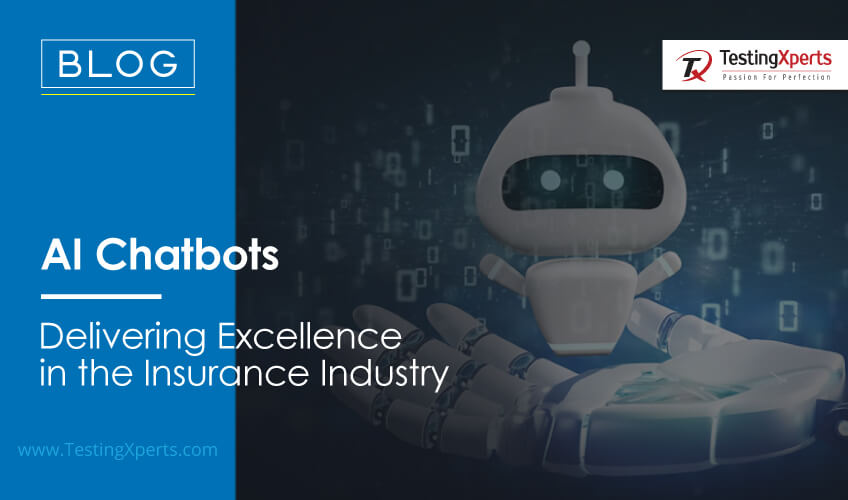
Artificial Intelligence (AI) was just a buzzword a few years back, but now it has become an indispensable part of human lives. AI is present almost everywhere, from smartphones, smart devices (Alexa, Siri, etc.), smart apps (Cortana, Google Assistant, etc.) to self-driving cars. With AI used across all fields such as Healthcare, Banking, FinTech, Insurance, etc., undoubtedly, this technology has its demanding presence even in the software testing field, which is on the rise today. Next-Gen technology is used in test automation to make the testing process smoother, faster, and more reliable.
- An overview of AI-based software testing
- How can AI help overcome test automation challenges?
- How is AI revolutionizing software test automation?
- AI-based software test automation methods
- Leading AI tools for automation testing
- Conclusion
An overview of AI-based software testing
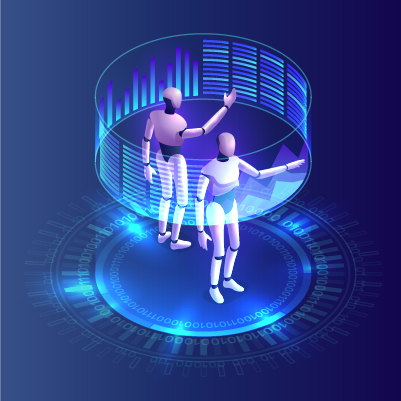
The software testing market has slowly changed from the initial manual testing to semi-automation, and then towards automation testing using tools. Further codeless automation, automation using bots leveraging AI & ML technologies, and specifically AI-based software test automation is in more demand in recent years.
AI-based software testing is an advanced software testing technique in which next-gen technologies like AI, Machine Learning (ML), and Deep Learning (DL) are used to test the software effectively. AI and ML apply problem-solving and reasoning techniques to automate and improve the testing process. AI-based testing can be performed effectively by leveraging tools that use data and algorithms to design and perform the tests without any human intervention. This advanced testing ensures better test coverage, test accuracy, faster time to market, and provides a significant reduction in overall testing costs.
AI is embedded into automated software testing processes making tests smarter, more reliable, and efficient. However, businesses continue to face many challenges associated with conventional automation testing methods and specifically, AI can be leveraged to overcome such challenges.
How can AI help overcome test automation challenges?
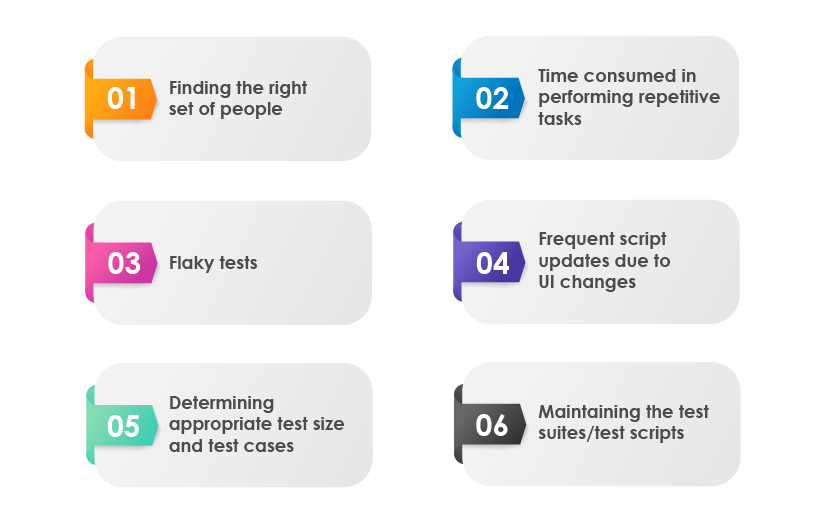
1. Finding the right set of people:

One major challenge associated with automation testing is finding the right team with the right skill set for scripting.
Solution: Businesses can leverage AI-based test automation tools that provide testers with a semi or fully codeless scripting platform, and can thus overcome the challenge of finding the right team and skill set.
2. Time consumed in performing repetitive tasks:

Every time a new test automation project comes up, no matter how reusable the components are, teams end up writing a lot of similar code again, which consumes a lot of time.
Solution: To overcome this challenge, AI can be utilized to generate test scripts quickly and automatically. AI tools can be trained based on the previous project inputs and outputs to create test scripts automatically for similar projects.
3. Flaky tests:

Testing teams spend hours determining if the failed test is due to application issues or poorly written test cases. These sorts of test failures are known as flaky tests, due to which a release is unnecessarily kept on hold, resulting in the delay of the software delivery.
Solution: AI can help teams overcome the challenge of flaky tests by creating more robust test cases and finding patterns in random test failures to speed up the process.
4. Frequent script updates due to UI changes:

In order to provide a seamless User Experience (UX), businesses tend to modify the app User Interface (UI). Even though the change may be minor or unnoticeable, it could fail the test scripts while performing some actions on the page.
Solution: AI and ML algorithm-based tools can be trained to determine minor changes in the code or bugs in the application. These tools can then take further actions accordingly and save human efforts in script updates for such minor changes.
5. Determining appropriate test size and test cases:
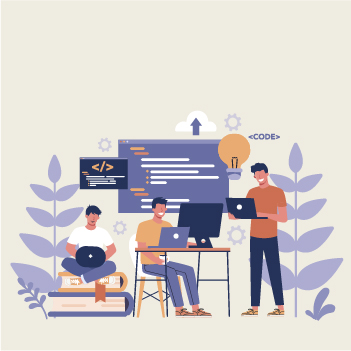
Every time a change is made in the application, regression tests are to be conducted. But, in a fast-paced environment, it is logically not feasible to run the entire regression suite of test cases for every change. Thus, determining the right size and set of test cases to be run for a particular change has always been challenging for the testing teams.
Solution: AI can help testers build algorithms that predict the right size and set the regression test suite for the given change based on different parameters.
6. Maintaining the test suites/test scripts:

As the size of an application becomes larger, it becomes challenging to maintain a large number of test scripts.
Solution: AI can be used to overcome this challenge as AI tools can be used to maintain and extract the required test scripts as per testing requirements.
Thus, AI helps overcome the challenges of traditional test automation and is said to bring a revolution in the field of test automation.
How is AI revolutionizing software test automation?
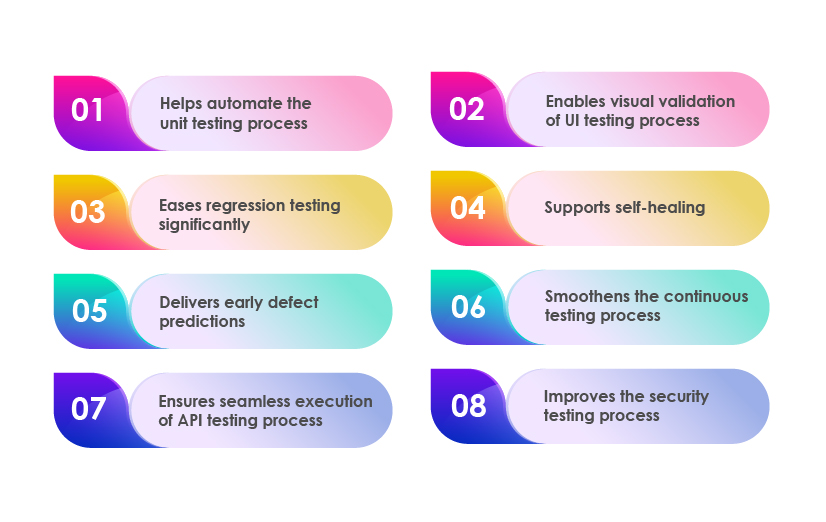
1. Helps automate the unit testing process:
AI can be used for static analysis of the software to decide which code area is not covered under unit tests. The AI-based software testing tools can use this information to generate unit tests for uncovered code. These tools can generate unit tests and even update the tests whenever the source code changes.
2. Enables visual validation of UI testing process:
AI can be used for UI testing as it involves the usage of image recognition techniques to navigate through the application. It can verify UI objects and elements visually to create UI tests. AI tools also use exploratory testing techniques to find bugs in the application’s UI. The AI tool generates the screenshot for later verification by QA engineers. It also verifies the other visual aspects of the system under test like color, size, layout, etc.
3. Eases regression testing significantly:
The AI-powered tools and AI-powered engines help to create tests faster, run thousands of tests in one go, and significantly reduce overall test maintenance. These tests work seamlessly across browsers and even mobile browsers.
4. Supports self-healing:
Many self-healing automation tools use AI and ML to automatically update and adjust changes in the UI or environment of the application. Typically, the AI tools detect the issues and remediate them without any human intervention through the self-healing method.
5. Delivers early defect predictions:
AI in testing helps in early and fast bug identification, reduces defects, and makes the product bug-free and reliable for end-users.
6. Smoothens the continuous testing process:
AI smoothens the continuous testing process by eliminating the chances of manual intervention. It can detect issues or defects in the testing process and trigger remedial measures to ensure continuity of the testing process. This ensures that only the bug-free code progresses from one stage to the next stage and helps to improve the quality across the software development lifecycle.
7. Ensures seamless execution of API testing process:
AI algorithms understand the patterns and relationships in different API calls and group them effectively based on the scenario. It understands the existing tests to learn about the relationship between APIs, and then uses this information to understand changes in APIs and finally creates new scenario-based tests.
8. Improves the security testing process:
AI can improve the security testing process by quickly identifying the cyber-security issues present in the software. It can extract information from the previously recorded data and analyze the system’s weaknesses in real-time. This way, AI can help businesses strengthen the security and privacy of their systems, application, data, and networks. It also allows testers to create more robust penetration tests.
Thus, it is evident that AI is used in all spheres of the automation testing process and ensures faster testing outcomes more efficiently without any human intervention.
AI-based software test automation methods
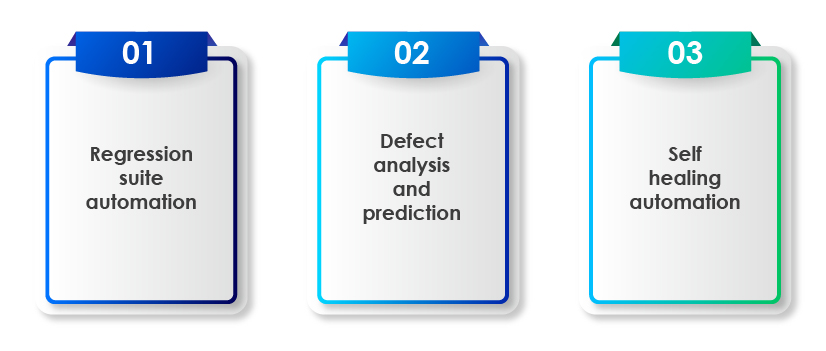
AI-based testing:
This testing method is an advanced software testing technique in which AI, ML, and DL technologies are integrated with the automation testing process to improve the software’s quality and speed up software delivery. Some of the common methods are:
Regression suite automation:
Regression testing consumes a lot of time and the tester’s efforts. AI-enabled regression suite automation intelligently runs automated tests based on the changes in the code each time. The main aim of this test is to reduce the regression test cycle time by identifying and executing the right set of test cases that must be executed.
Defect analysis and prediction:
It involves the usage of ML and NLP algorithms that helps with the effective identification of software defects. The main aim of this test is to ensure the early identification of defects and help businesses go to market early.
Self-healing automation:
AI-enabled self-healing process involves automatic healing of test automation script breakages that could occur due to object or other property changes. The main aim of this test is to ensure lesser manual intervention and a faster self-healing process.
Leading AI tools for automation testing
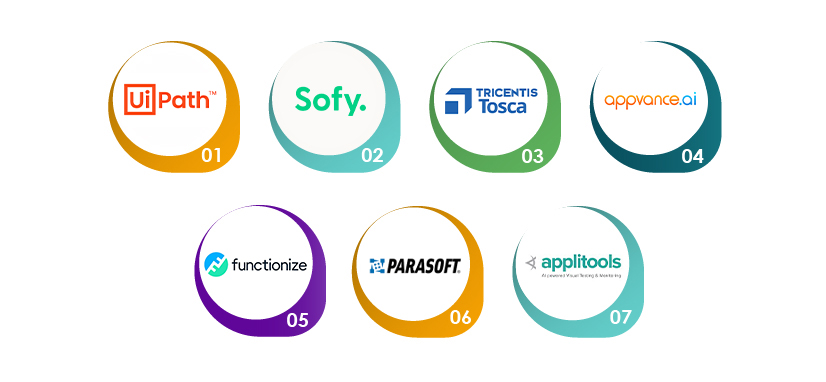
UiPath Test Suite:
UiPath Test Suite combines the world’s leading Robotic Process Automation (RPA) technology with best-of-breed testing capabilities to accelerate scaling through proactive testing, cross-enterprise collaboration, and a consistent approach to create and deploy automation. UiPath Test Suite benefits practitioners who create automation and stakeholders who depend on automation, including transformation leaders, business users, customers, and partners. UiPath Test Suite consists of Test Manager, Studio Pro, Orchestrator, and Robots, and other Test Studio Components. Moreover, it fosters collaboration through reusable artifacts and has a user-friendly interface.
Sofy.Ai:
It is an AI-powered, no-code quality automation platform that leverages the power of AI to test mobile apps on a variety of android and iOS devices. It can be used to perform manual, automated, and RPA testing of apps. Uniquely, this no-code testing platform simplifies testing, saves testing time, increases productivity, and shortens the testing life cycle. This intelligent automation testing tool simplifies manual, automated, and robotic testing in a significant way.
Tricentis Tosca:
It is an enterprise software testing tool used for end-to-end automation testing of software applications. This tool comes with amazing features like Vision AI, model-based test automation, risk-based test optimization, etc. The Vision AI feature of this tool leverages the power of AI to automate and customize tests. It uses deep convolutional neural networks combined with advanced heuristics to deliver stable, self-healing, platform-agnostic UI automation. Vision AI, together with Tricentis Tosca, can be used to automate even the hardest-to-access UI systems.
Appvance IQ:
It is an AI-driven autonomous continuous testing system that can be used for test creation and execution. This tool allows the generation of autonomous tests and codeless test creation and can be used to execute functional, performance, and security testing. This tool supports continuous testing in a DevOps environment and can be easily integrated with Jenkins, TeamCity, CircleCI, Jira, and other CI/CD tools.
Functionize:
It is a cloud-based automation testing tool that is used for functional and non-functional testing (load and performance testing). This tool uses AI and ML algorithms to speed up test creation and maintenance. This AI tool uses a plain English language and NLP to create a functional test. Also, this tool can execute thousands of tests in a minute from all desktops and mobile browsers.
Parasoft:
It is an automated testing tool that can be used to automate the tests at every stage of the software development cycle, starting from code analysis to UI Testing. It is a test suite with various components, and it has recently introduced AI and ML into software test automation to help organizations adopt static analysis. Parasoft’s AI solution can be used to detect defects early and to ensure compliance with a variety of functional safety, security, and coding standards. It reduces the burden of teams and ensures serious design issues are addressed first.
Applitools:
It is an AI-powered visual testing and monitoring platform that is easy to set up and integrates with all modern test frameworks. This tool supports all major browser versions and allows to check the functionality and appearance of the app on various devices like mobile phones, tablets, laptops, or external monitors.
Conclusion
AI in software test automation has become an important trend and has a tangible reality as AI holds the potential to take software testing to the next level. Undoubtedly it helps testers to generate more tests and ensures the speed and reliability of automated tests. But integrating AI into software test automation needs professional assistance as it is a complex process. Businesses can leverage AI testing from a Next-Gen QA and independent software testing services provider for high-quality software and faster time-to-market.
Discover more
Get in Touch
Stay Updated
Subscribe for more info




